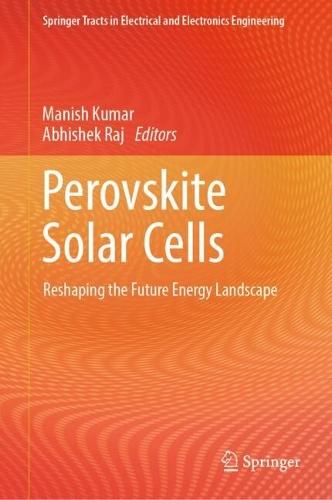Overview
Perovskite Solar Cells (PSCs) have shown the significant advancement in the field of photovoltaic technologies, which are transforming the renewable energy landscape through their remarkable efficiency and adaptability. This Book explores the synthesis techniques, characterization, and utilization of perovskite materials, including lead-free alternatives, tandem configurations, and novel strategies for indoor and large area PSCs. Featuring detailed analyses of the fundamental optoelectronic properties, stability issues, and device engineering techniques, this volume offers critical insights into the scientific advancements driving innovations in sustainable and high-performance solar energy solutions. This book serves as vital resource for researchers, materials scientists, and industry professionals interested in the groundbreaking potential of perovskite solar cells in redefining the future of photovoltaics.
Full Product Details
Author: Manish Kumar ,
Abhishek Raj
Publisher: Springer Nature Switzerland AG
Imprint: Springer Nature Switzerland AG
ISBN: 9789819694624
ISBN 10: 9819694620
Pages: 406
Publication Date: 01 November 2025
Audience:
Professional and scholarly
,
Professional & Vocational
Format: Hardback
Publisher's Status: Active
Availability: Not yet available

This item is yet to be released. You can pre-order this item and we will dispatch it to you upon its release.
Author Information
Manish Kumar obtained his M.Tech. degree in Ceramic Engineering from IIT (BHU), Varanasi, and his Ph.D. degree in Physics from the Institute of Science, Department of Physics, Banaras Hindu University, Varanasi, India. He has been serving as an Assistant Professor in the Department of Physics at ARSD College, University of Delhi, New Delhi, India, for more than 12 years. His research focuses on environmentally friendly multifunctional materials for energy and memory devices, materials for green energy solutions, multiferroics, magnetoelectrics, composites, perovskite materials for photovoltaic applications, supercapacitors, white light-emitting materials, solar simulation via different software, and DFT calculation. He has published more than 123 research papers in international journals of high repute, authored one book on white light-emitting materials, edited five books, contributed 27 international book chapters, and holds one Indian patent. He has delivered talks at numerous national and international conferences and is a member of various research committees at different universities. Additionally, he has completed two national research projects and received the best research award from his institute. He has supervised and is currently supervising several Ph.D., M.Tech./M.Sc., and B.Sc./B.Tech. students. Dr. Kumar serves or has served as an editor for several highly reputed journals. Abhishek Raj received his Bachelor of Technology degree in Electrical and Electronics Engineering from Cochin University of Science and Technology, Kochi, and completed his M.Tech. and Ph.D. (M.Tech.-Ph.D. dual degrees) from the Academy of Scientific and Innovative Research (AcSIR) at CSIR-NEERI, Nagpur, India. He has published 27 international research papers and one book chapter in an international research book of high repute. He also received the Late Shri P.S. Dutt Memorial Award for “Best Young Researcher” for his significant contribution to R&D in Environmental Science & Engineering, presented during the 65th CSIR-NEERI Foundation Day celebration on April 8, 2023. His research focuses on the design and development of lead-free perovskite solar cells through experimental and computational approaches.



